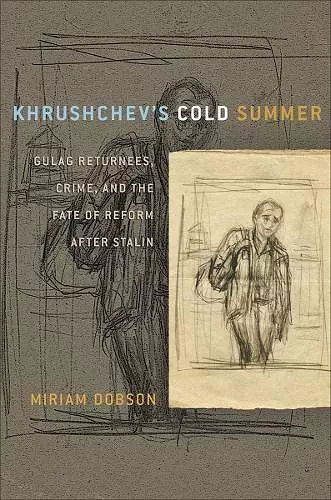Khrushchev's Cold Summer
Gulag Returnees, Crime, and the Fate of Reform after Stalin
Format:Paperback
Publisher:Cornell University Press
Published:15th Oct '11
Currently unavailable, and unfortunately no date known when it will be back
This paperback is available in another edition too:
- Hardback£44.00(9780801447570)

Between Stalin's death in 1953 and 1960, the government of the Soviet Union released hundreds of thousands of prisoners from the Gulag as part of a wide-ranging effort to reverse the worst excesses and abuses of the previous two decades and revive the spirit of the revolution. This exodus included not only victims of past purges but also those sentenced for criminal offenses.
In Khrushchev's Cold Summer, Miriam Dobson explores the impact of these returnees on communities and, more broadly, Soviet attempts to come to terms with the traumatic legacies of Stalin's terror. Confusion and disorientation undermined the regime's efforts at recovery. In the wake of Stalin's death, ordinary citizens and political leaders alike struggled to make sense of the country's recent bloody past and to cope with the complex social dynamics caused by attempts to reintegrate the large influx of returning prisoners, a number of whom were hardened criminals alienated and embittered by their experiences within the brutal camp system.
Drawing on private letters as well as official reports on the party and popular mood, Dobson probes social attitudes toward the changes occurring in the first post-Stalin decade. Throughout, she features personal stories as articulated in the words of ordinary citizens, prisoners, and former prisoners. At the same time, she explores Soviet society's contradictory responses to the returnees and shows that for many the immediate post-Stalin years were anything but a breath of spring air after the long Stalinist winter.
Khrushchev's Cold Summer mines recently opened archives, evoking the texture of returnees' lives from documentation of their interactions with the state—their petitions to Soviet authorities, and their investigation by police and persecutors when some again fell foul of the law.
* TLS *A fascinating journey into the first decade after Stalin's death and the transition from political terror to what later became known as 'the Thaw.' Khrushchev's Cold Summer is not simply an excellent piece of scholarship. It is a very important contribution to understanding the aftermath of the Gulag and the encounter of the returnees with the rest of society—including those who had imprisoned them as well as those who stood by silently—as a multi-faceted social process, a lot more complex and messy than was envisioned by the artistic intelligentsia.... Dobson maps this complexity beautifully, without diminishing the role of the intelligentsia's cultural production—films, literature, etc.—in shaping our perceptions of political terror, de-Stalinization and the aftermath of the camps.
-- Adi Kuntsman * H-Soz-u-Kult *Dobson's book is a fascinating study of the scope and limits of criminal justice policy liberalization in an authoritarian regime. On the one hand, as noted above, Khrushchev’s reforms were limited from the outset by his unwillingness to countenance measures that could undermine the Communist Party’s rule, as well as his increasing disappointment with (as he saw it) the unwillingness of the ex-convicts to conform to the norms of Soviet society. Indeed, one of Dobson’s more interesting findings is that criminal justice reforms were also blocked in part by popular opposition. As she argues, Khrushchev and his government had to deal with—and ultimately accommodate—the highly punitive views of many Soviet citizens and low-level officials, which of course had been encouraged (not to say required) during Stalin’s more than two decades in absolute power. On the other hand, the fact remains that Khrushchev managed to engineer the release of some 4 million prisoners from the Gulag over a barely five-year period, which must surely make the amnesties of the early 1950s one of the largest releases of prisoners in contemporary world history.
* Law and Politics Book Review *In an original and provocative book, Dobson examines two of the most important developments of the Khrushchev years—the emptying of the Gulag and the widespread, popular apprehension about the wave of criminality that swept across the Soviet Union during the 1950s and 1960s.
* Slavic Review *This outstanding book examines the return of prisoners from the Gulag in the Soviet Union during the first decade after the death of Stalin.... Dobson considers the experiences not only of the minority of political prisoners from the Gulag, but also the majority who had been convicted of other crimes, including many prisoners who were hardened criminals. The prisoners' release set off a wave of anxiety in the country as some of the returnees committed crimes as they returned from their remote places of imprisonment and exile. The author examines the actions of the political leadership and how Khrushchev and other leaders were forced to deal with the unexpected consequences of their decisions. The impact of the prisoners' return on their families and others in their communities is also analyzed. Highly recommended.
* Choice *While Dobson's argument is refreshingly new, her deft and insightful handling of sources is the real strength of this book. Khrushchev’s Cold Summer is a gem of historical scholarship.
* American Historical Revi- Winner of Winner of the 2010 Wayne S. Vucinich Prize given b.
ISBN: 9780801477485
Dimensions: 235mm x 155mm x 19mm
Weight: 454g
280 pages